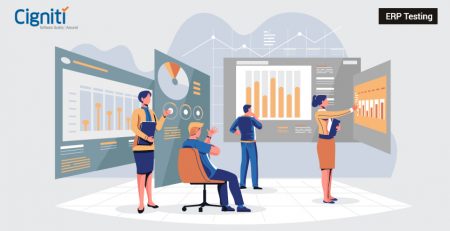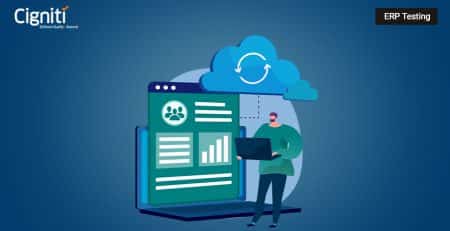Efficiency Unleashed: 5 Ways ERP Testing Propels Business Growth
In the rapidly evolving business technology landscape, Enterprise Resource Planning (ERP) systems have emerged as essential tools for organizations looking to streamline operations, enhance efficiency, and elevate decision-making processes. An ERP system integrates various business processes, such as finance, human resources, sales, and inventory, into a unified platform, fostering cohesion and productivity. However, an ERP system’s successful implementation and utilization require meticulous planning, execution, and evaluation. One of the cornerstones of this process is ERP testing, which plays a pivotal role in ensuring the system’s functionality, security, and effectiveness.
In this blog, we delve into the five key benefits of ERP testing, illuminating how it enables organizations to maximize their business potential and reap the rewards of a well-integrated and smoothly functioning ERP system.
1. Ensuring Seamless Integration and Functionality
At the heart of every successful ERP system lies the ability to seamlessly integrate diverse business functions, enabling data flow and accessibility across departments. ERP testing services rigorously evaluate the system’s integration and functionality. It ensures modules interact harmoniously and transfer critical data accurately. Without thorough ERP software testing, integration glitches and data discrepancies may hinder operations, leading to inefficiencies and errors. Organizations can prevent costly disruptions during ERP implementation services by identifying and rectifying integration issues early in the process. The result is a well-connected system that empowers business processes and catalyzes operational excellence.
2. Mitigating Business Risks and Ensuring Compliance
Industries subject to rigorous regulations, like the General Data Protection Regulation (GDPR), prioritize compliance and risk management. ERP testing is indispensable for mitigating business risks and maintaining regulatory compliance. Thorough testing allows organizations to identify security vulnerabilities, data breaches, and access control gaps. This meticulous examination safeguards sensitive business information, protecting against financial fraud and securing customer data. Compliance with industry standards and government regulations enhances the organization’s reputation and fosters trust among stakeholders and customers.
An extensive set of test data would help testers thoroughly validate various edge conditions and scenarios within a system. This would help both the above two benefits of ensuring seamless integration & functionality, and mitigate business risks & ensure compliance.
3. Enhancing User Experience and Productivity
The effectiveness of an ERP system hinges on its user experience (UX). An intuitive user interface (UI) and seamless navigation are critical for user adoption and productivity. ERP application testing scrutinizes the system’s user interface, responsiveness, and alignment with diverse user roles. By ensuring a positive user experience, ERP testing services drive increased productivity. Employees can swiftly navigate the system, access vital information, and execute tasks without complications. This optimized user experience facilitates a smooth transition during ERP implementation, fostering employee satisfaction and improved overall performance.
4. Optimizing Performance and Scalability
As organizations grow and adapt to changing market dynamics, their ERP system must accommodate increasing data volumes and user demands. Performance and scalability testing are crucial in optimizing an ERP system’s performance. Organizations gain insights into the system’s capacity to handle peak loads and heavy user traffic by simulating real-world scenarios and conducting stress tests. This information empowers decision-makers to strategize infrastructure upgrades and necessary adjustments, ensuring the ERP system scales effortlessly with business growth. ERP testing services contribute to an adaptable and high-performing system that can evolve with the organization’s needs.
5. Cost-Effective Resource Management
While some organizations may view ERP testing as an additional expense, it is a cost-effective investment in the long run. Organizations avoid costly post-implementation rework and corrections by detecting and addressing issues during the testing phase. ERP testing also aids in fine-tuning the system, eliminating inefficiencies, and optimizing resource allocation. As a result, CXOs can confidently assert that their ERP investment delivers optimal returns. The system’s enhanced efficiency and productivity drive business growth, ensuring that the return on investment (ROI) justifies the initial expenses.
ERP testing is an indispensable step toward maximizing an organization’s business potential. By embracing thorough ERP software testing and leveraging ERP testing services, CXOs and decision-makers can unlock many benefits. These benefits encompass seamless integration, risk mitigation, enhanced user experience, optimized performance, and cost-effective resource management. Acknowledging the power of ERP testing, organizations can ensure a successful ERP implementation that paves the way for operational excellence, improved productivity, and sustained growth. In a dynamic and competitive business landscape, prioritizing ERP testing proves to be a strategic move that propels organizations toward success. Need help? Read more about Cigniti-QuerySurge Partnership to learn how we can speed up your ERP testing efforts and propel your business growth.





Leave a Reply